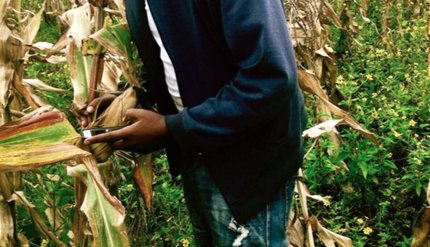In 2016, in response to the Fall Armyworm (FAW) outbreak across Africa, Nuru developed a system of mobile data collection, data visualization, and targeted training and extension that provides timely, accessible and actionable FAW information directly to farmers. The system develops the capacity of Nuru staff and partners to effectively use smartphones, interpret mobile survey software, and comprehend geospatial data analysis. Smart farming is not a static concept that can be pulled off a shelf and applied in any context. Agriculture by its very nature requires constant tweaks, touch-ups, and, most importantly, needs to be informed by data.
Tewodros (Teddy) Dawit, Nuru Ethiopia Data Entry Officer, tested the system in 2017 as part of a Nuru International/Nuru Ethiopia joint-initiative. Teddy is now leading the training and supporting the rollout of a local language smart farming monitoring system with a suite of feedback loops from training to data collection to community feedback. This allows Nuru to provide farmers and local government partners with timely, actionable, and relevant insights for combating FAW and managing their productive assets field-to-field and across their shared landscape.
Data that reaches farmers needs to be timely, seasonal in its flow, and precise without preconception. To be effective, monitoring and evaluation systems must inform the intended participants and actions on the ground. This is an effort Nuru is dedicated to, but it is tough work to consistently implement and scale. Nuru aspires to confront the challenge of arming farmers with timely information through partnerships with innovative actors. We always have a keen eye to transparency and accountability with and for local communities.
For more on Nuru farmer experiences with the FAW Outbreak in 2018, please visit here.


